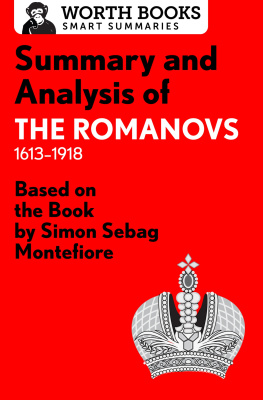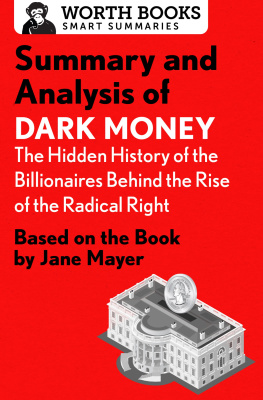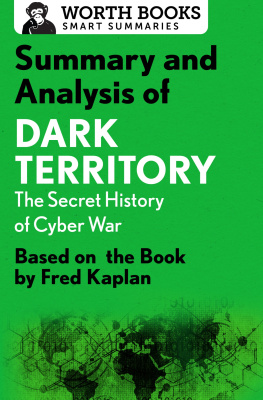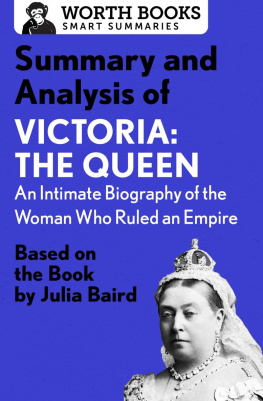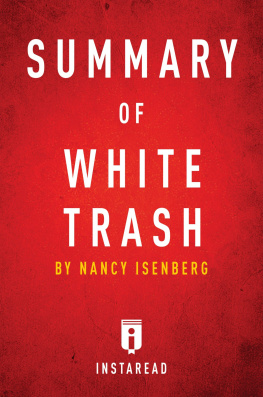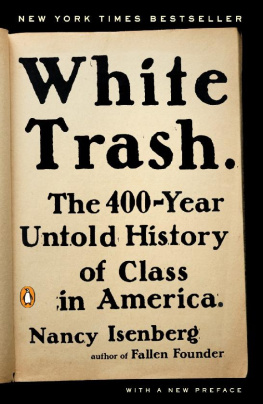Sign up for our newsletter to discover more ebooks worth reading.
EARLY BIRD BOOKS
FRESH EBOOK DEALS, DELIVERED DAILY
LOVE TO READ ?
LOVE GREAT SALES ?
GET FANTASTIC DEALS ON BESTSELLING EBOOKS DELIVERED TO YOUR INBOX EVERY DAY!
Summary and Analysis of
White Trash
The 400-Year Untold History of Class in America
Based on the Book by Nancy Isenberg
The summary and analysis in this ebook are meant to complement your reading experience and bring you closer to a great work of nonfiction. This ebook is not intended as a substitute for the work that it summarizes and analyzes, and it is not authorized, approved, licensed, or endorsed by the works author or publisher. Worth Books makes no representations or warranties with respect to the accuracy or completeness of the contents of this ebook.
Contents
Context
White trash, clay-eaters, waste people, rednecks, crackersthese are only some of the names poor whites have been called in the United States, going as far back as the Revolutionary War. Nancy Isenbergs White Trash: The 400-Year Untold History of Class in America details the genesis of the white underclass, challenging the idealistic notion that for poor whites, thrift, hard work, and morality beget class mobility.
To do so, Isenberg takes us back to the first English settlements, where a shadow underclass provided the labor alongside still-more-disadvantaged slaves, to the Civil Wars legion of disposable soldiers, and up through present-day pop and political culture. Here, she examines the origins of the language and attitudes that have derided poor white Americans for centuries, such as the dirt-poor Ewells of To Kill a Mockingbird , whom even principled Atticus Finch considers irredeemable.
Poor white Americans are no longer cast as a biologically distinct, degenerate breed. Still, they are regarded by the more moneyed classes as under-educated and culturally illiterateand uniquely responsible for Americas historical racism. In 2016, the media cast them as the decisive force behind the election of Donald Trump, a president whose breed of populism echoed that of Andrew Jackson, the first folksy president. As the wealth gap grows ever wider between rich and poor Americans, White Trash s detailed history gives valuable insight into how the new president curried the favor of this oft-overlooked population, and how they might fare under his presidency.
Overview
While most adult Americans realize that the tale of the pilgrims and Indians first Thanksgiving is a fond fantasy obscuring a brutal history, we are less cognizant that the notion of a land of opportunity is another shibboleth. White Trash: The 400-Year Untold History of Class in America is a detailed account of the American class system that begins with English speculators in the 16th century and extends to modern-day reality television stars.
The first falsehood of American history is that Englands colonies were solely an outpost for those seeking religious freedoms. Actually, they were Englands waste-heap, a workhouse for their poor and criminal classes. Most settlers did not build communities or embrace freedom of thought: They were expendable laborers that died in droves from disease and starvation, which took out entire settlements. Those who survived lived in misery, bound in an indentured servitude that was near-impossible to escape. Unlike slaves, they were not permanently owned by their wealthy masters, but their inability to amass property or wealth meant their freedom was effectively worth little.
As the colonies grew throughout the 17th and 18th century, so too, was a rigid social hierarchy codified. Founding Fathers Benjamin Franklinwho called poor whites refuseand Thomas Jeffersonhimself a slave ownerhad numerous unrealized proposals to uplift poor Americans, mainly in the service of creating a sustainable and productive breed of American farmers and workers. The Revolution brought the country freedom from England, but that was for wealthy landowners: Poor whites, though they fought for their new nation, gained little autonomy or authority in the bargain.
The democratizing of the West through pioneers is yet another myth. As the country expanded, poor whites were seldom the beneficiaries of precious land. At the same time, the false science of eugenics took hold, with poor whites among the most demonized. Only during the Great Depression, when so many were thrust into lives of poverty, did the formerly middle class begin to consider that the longtime poor might not be responsible for their own hardship.
In our contemporary culture, the term white trash has become a point of pride. From comedians to reality TV to talk radio to music, poor whites have embraced their pedigree, which has the paradoxical effect of making their lives, yet again, seem a deliberate choice. Isenbergs holistic examination decisively establishes that while embracing redneck identity might be a choice, being poor in America has never been a temporary designation.
Summary
Preface
In America, there is a class of white people for whom social mobility and equality are a vanishing prospect: white trash (Also known as waste people, rednecks, and a slew of other colorful terms). History and culture have mainly been silent on this derided class, and insulting depictions of themsuch as the clownish rubes of The Beverly Hillbillies or the despicable Ewells of To Kill a Mockingbird pass without comment. In White Trash , Isenberg brings rural white Americans into focus, tracing their history and examining how their poverty evolved into an inescapableand reviledidentity.
Need to Know: Poor white people in America have historically been used as pawns to do the upper classes dirty work without being fairly compensated. Their resulting poverty is blamed on their lack of initiative and genetic inferiority.
Introduction: Fables We Forget By
In America, we tell ourselves we have no class distinctions because, under our constitution, all men are created equal. But for a comfortable middle class to exist, another class must reside below it. Since our countrys inception, we have nourished a white underclass deemed unworthy of notice or aid. Since the 1600s, poor whites have been held responsible for their station, faulted for criminality, disease, boisterousness, and idleness. Always a crucial part of our countrys economy, poor whites are also permanent cultural tropes: even now, depictions proliferate in our books, films, and TV shows. In recent decades, rednecks have responded by embracing the designation and its traits. Elites have blamed everything from genetics to obstinacy to inherent laziness, but there is a far more complex history as to why poor white trash exists and has been forced to remain as such.


